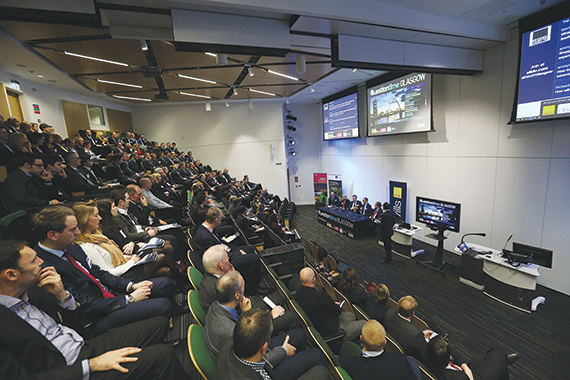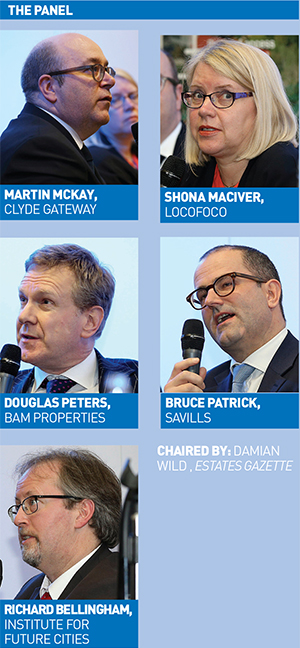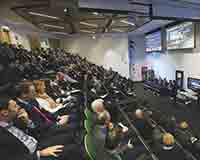 The five months of low activity in the run-up to the independence referendum may have influenced voting when research houses were compiling their lists of the most attractive investment destinations for this year, but the Scottish vote was not the biggest talking point as Estates Gazette landed in Glasgow for its first Question Time of 2016.
The five months of low activity in the run-up to the independence referendum may have influenced voting when research houses were compiling their lists of the most attractive investment destinations for this year, but the Scottish vote was not the biggest talking point as Estates Gazette landed in Glasgow for its first Question Time of 2016.
“[The referendum] needs to be treated as noise,” said Savills UK investment director Bruce Patrick. “For every investor that is scared away by the discussion over the referendum and continuing Scottish support for the SNP, there are two or three waiting to get in. It is a fantastic country and global city and it is a great place to invest.”
BAM Properties managing director Dougie Peters added: “I think it is overstated in people’s minds. What is more important is how the new powers coming to the Scottish government are used. If these powers are used well this perception will recede.”
 The £1.1bn City Deal between the UK and Scottish governments and eight local authorities across Glasgow and the Clyde Valley was discussed at length during the debate.
The £1.1bn City Deal between the UK and Scottish governments and eight local authorities across Glasgow and the Clyde Valley was discussed at length during the debate.
The panel, which also featured Clyde Gateway director of regeneration Martin McKay, director of the Institute for Future Cities Richard Bellingham, and Locofoco brand consultant Shona Maciver, largely agreed that the City Deal would benefit the city and the real estate industry.
However, there was scepticism over the level of funding and how much impact it might have over the 20-year timeframe of the deal.
“If you take £1bn and divide it by 20, it’s £50m, and if you look at major residential or commercial schemes in Glasgow that are planned, it’s pretty easy to spend £50m a year,” said Patrick.
He said developers needed to engage with politicians to make sure every drop of the City Deal funding was being spent on the right thing.
He believed that the vibrant city centre would survive and regenerate naturally, but that the outer towns, those hurt most by the recession, needed more support for regeneration.
McKay dubbed the City Deal a game-changer that would allow plans which had been in the pipeline to move forward.
He said the deal was expected to bring with it some £3bn of activity and would ultimately be about city competitiveness and how Glasgow ranks in terms of that. “The City Deal gives us the opportunity to push ourselves up,” he said.
And while the northern powerhouse may have secured more column inches in the press over the past year, the panel was not overly concerned that Scotland – or Glasgow – would lose out to England’s northern cities.
Mckay said: “We have got to learn from what is happening with the northern powerhouse. From a Scottish perspective, we just need to be better joined up. We need to work at making Scotland, Glasgow in particular, a better investment opportunity.”
He did not believe that the northern powerhouse had stolen a march on the Scottish cities but did admit that they had a bit of catching up to do.
Bellingham said growth in the northern powerhouse could actually benefit Scotland.
“I don’t think the northern powerhouse winning is automatically a loss for Glasgow or Scotland,” he said. “There are no walls around the economy of Manchester. If the economy around cities grows, there is more demand and demand that can be met by Scottish companies.”
So, was there anything to dampen the mood in Glasgow?
The cost of empty rates remained a threat, but was seen by most of the panel as a ball that often got kicked around but never scored. Government’s inconsistency was the real annoyance.
“I find it quite fascinating that one arm of the government is putting the foot on an accelerator and bringing forward other types of investment to encourage economic growth, but at the same time putting its foot on the brake,” said McKay. “And I can see how rates will affect investment decisions.”
While Brexit was cited as a potential threat to growth, the panel thought the possibility of the UK leaving the EU was unlikely to have an impact on the Scottish real estate market.
“I have not heard anyone say ‘I’m not buying that office because of Brexit’, and I don’t expect to,” said Patrick.
The only true potential limiter for Glasgow, according to Locofoco’s Maciver, lies in the city’s own psyche.
“Glasgow has to keep playing to its strengths,” she said. “Manchester is great, but the truth is Glasgow began this thing in a way that Manchester didn’t by allying itself with the arts and rising phoenix-like from its own ashes.
“My anxiety is not whether or not it competes with Manchester and the other cities, it is that it loses its mojo and fails to understand what gave it that in the first place.”
The future of cities
Richard Bellingham, director of the Institute of Future Cities at Strathclyde University, kicked off Question Time with a discussion about how cities need to change.
“Cities are being used to subvert the powers of national governments,” he said. “Local governments are taking on goals and agendas for which the national government is unwilling, and being far more ambitious. This change creates a raft of opportunities.
“We will see a lot more intelligent pushing of information, an understanding of who you are and what you would like to receive, and it will be delivered to you automatically.”
Bellingham added that he would have spent the money from the Glasgow and Clyde Valley City Deal, which is largely targeted at improving infrastructure and employment, to establish residential schemes in the city centre to bring dwellers back to town. He said 5% of the Glasgow population live in the city centre, far less than the norm.
To listen to the debate in full subscribe to the EG podcast in the iTunes store or click here
Find out more about the Question Time series of events here
EG Question Time in association with Savills, Conveyancing Risk Solutions, and Invest Glasgow, supported by Scottish Property Federation and UK Property Professionals











